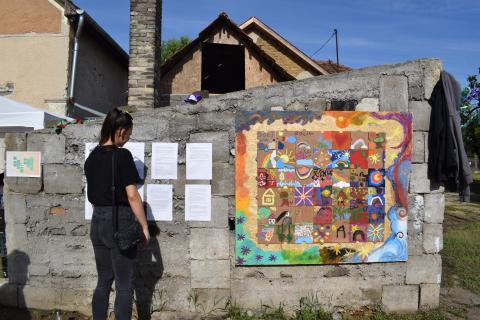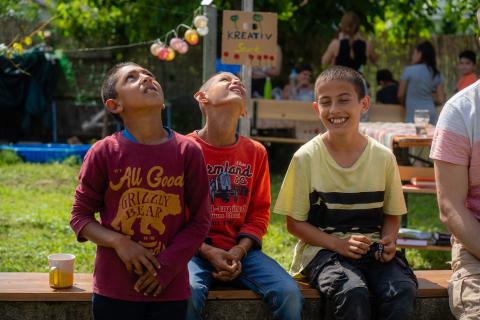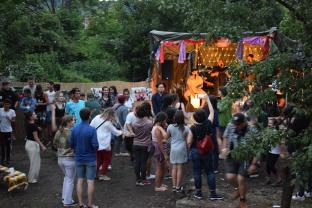
Vera Riesz, who graduated from CEU this June with a BA in Culture, Politics and Society, augmented her studies by taking a leadership role producing the Udvar Festival in June. The event, now in its third year, is a summer camp and festival held in Arlo, Borsod, one of Hungary's most disadvantaged counties with a significant Roma population.

The Udvar Festival was initiated by four CEU bachelor’s students in 2022 as an experiential learning project, which provides students with a first-hand experience of applied work in a cultural institution or project. Riesz, who is from Budapest, has been involved since the first edition and in leadership since 2023, contributing Hungarian language skills and ongoing cultural organization to continue the project. She double majored in Sociology and Social Anthropology, and Visual Theory and Practice, and is interested in cultural policy in Hungary. Her thesis focused on the memory of the Holocaust in contemporary Hungarian theater plays.
“The Udvar Festival is a place where I can support people coming together. The stigmatization and the segregation of Roma people is a significant issue. Our organizing team provides the workforce and the funds, and the goal moving forward is for the people of Arlo to be the ones coordinating locally and making decisions about the programs,” said Riesz, who received CEU’s Outstanding Service to Community Award in June for her intercultural work on the festival.

For the Udvar Festival, Riesz and her fellow organizers worked closely with the local Jelenlet Haz, a social work organization supporting Roma people, and Van Helyed (You Belong), which is focused on education and family services. In addition, the Udvar Festival received funding from the Open Society University Network, CEU Student Center’s Civic Engagement Fellowship and the Civic Engagement Arts and Culture Unit. Riesz said that working with such local organizations that are somewhat known to the local Roma population in Arlo has been critical to the festival’s success and presence in the region.
“This year, we built a stage with a local from Arlo, and we had support from the community. That was a great win because they will now have this stage to use for the next decade,” said Riesz. She added that centering and celebrating Roma music, arts and culture in the case of the festival meant providing an occasion and physical space where numerous attendees were onstage dancing together and witnessing storytelling at various points in the program.

“One of the biggest takeaways for me is learning that we really have to listen. For instance, to put together the program, you must figure out who you want to speak to. When you have multiple target audiences, which we do, it's a challenge to strike a balance,” said Riesz. “It's always an experiment in a way. We try to listen to the people whose culture we are celebrating and their recommendations, so it's always this give and take.”